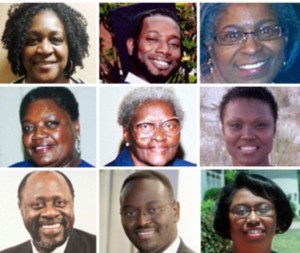 I’ve had many conversations during the past week about the shooting at Mother Emanuel Church in Charleston, including some at Shomrei. We talked about it during the Avodah service – that the attack had occurred in a house of worship, a place where you’d expect to feel safe. During Talmud study, we talked about forgiveness.
I’ve had many conversations during the past week about the shooting at Mother Emanuel Church in Charleston, including some at Shomrei. We talked about it during the Avodah service – that the attack had occurred in a house of worship, a place where you’d expect to feel safe. During Talmud study, we talked about forgiveness.
“You took something very precious away from me” said Nadine Collier, whose mother was killed, “But I forgive you.”
“Just as Jesus died for our sins, we forgive you for your sin,” said Reverend Campbell Singleton, pastor of the Union Baptist Church in Montclair at last week’s prayer vigil.
We asked Rabbi Greenstein – Is forgiveness something Christian? Is there something not Jewish about forgiveness? What is forgiveness anyway?
Forgiveness is not about forgetting. Remembering is very Jewish.
Forgiveness is not about absolution. Forgiving someone doesn’t mean that what that person did was okay.
Forgiveness helps the person who is doing the forgiving. When we choose to forgive, we let go of feelings like hate and anger that can poison us.
Forgiveness is something you have to seek – tshuvah, a turning back to God. But as Jews we believe that you cannot ask God for forgiveness without first asking forgiveness from the people you have harmed.
Who can forgive? “I can’t forgive,” wrote Roxanne Gray in yesterday’s NY Times. “I have no immediate connection to what happened in Charleston, S.C. last week beyond my humanity and my blackness, but I do not ever foresee forgiving his crimes, and I am wholly at ease with that choice”.
Forgiveness is the prerogative of the people who were harmed, the family and members of Mother Emanuel Church. We cannot grant forgiveness for harm done to someone else. But I think it is also the prerogative of the larger Black community since this was a racially motivated attack based on a negative stereotype of all people who are Black.
Forgiveness is very Jewish, although we may define it in our own way.
I have had many conversations during the past week as I have tried to grapple with my feelings about the shooting in Charleston. I am grateful that Shomrei provides a place to have such conversations.
I will end with this comment from Rabbi Greenstein: When I contemplate the group settings in which we discussed this, I appreciate how they are, in themselves, spaces of “forgiveness” in that they allow space for all of us to be there. In that sense the forgiveness is not a subsequent reaction to a wrongdoing but a prior condition of acceptance.
- Shabbat in Uzbekistan - Wed, Apr 17, 2024
- Purim in Uzbekistan - Thu, Apr 4, 2024
- Quick-ish Soups - Thu, Feb 22, 2024
